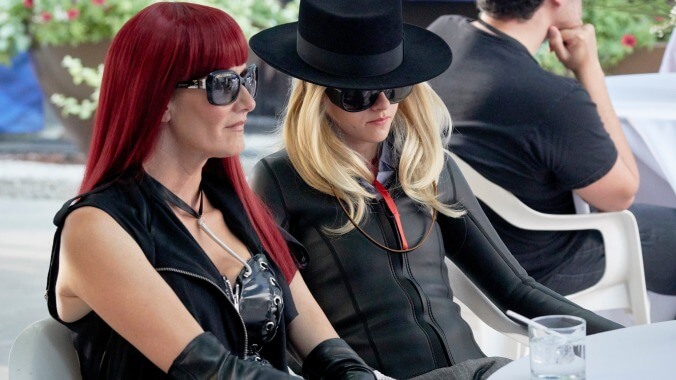As a result, JT LeRoy opens in medias res (vis-à-vis its title, anyway), with the arrival of Knoop in Albert’s life. (She was the sister of Albert’s boyfriend and bandmate Geoffrey, played in the film by Jim Sturgess.) It’s 2001, and LeRoy’s first novel, Sarah, has already been published, and the reclusive teenage writer with the sordid personal backstory has become a lit-world phenomenon endorsed and befriended by various celebrities. The trouble is, Albert, at 36, can’t possibly pass for a 16-year-old boy—except over the phone. Knoop, on the other hand, looks young and androgynous enough that Albert asks her to pose as JT in a photo shoot to accompany a previously conducted phone interview, the better to fend off any suspicion that LeRoy might be a hoax. From there, the deception snowballs, as Knoop speaks at numerous public events in the low Southern drawl Albert invented for the character. She eventually even hooks up with a major Hollywood movie star as LeRoy. This enrages Albert, who resents seeing someone else receive the adulation that she believes she deserves.
That’s a compelling dynamic, one you’d normally expect to see unfold from the viewpoint of the person losing control of their creation. That’s where the meat of the drama lies. Instead, Knoop and director-cowriter Justin Kelly (I Am Michael, King Cobra) argue that JT LeRoy was “himself” a work of art created by two women—one who did the writing and most of the talking, and one who did the being. There’s an intriguing queer subtext to this aspect of the story, one that’s bolstered by Stewart’s quiet, sensitive performance. The film’s strongest sequences involve Knoop/LeRoy’s relationship with the aforementioned movie star, Eva (Diane Kruger), who’s directing and starring in an adaptation of Sarah. This character was clearly inspired by Asia Argento, who directed and starred in The Heart Is Deceitful Above All Things, based on LeRoy’s second novel. (Details presumably had to be altered for legal reasons; the film was in the can prior to accusations of sexual assault made against Argento last summer.) Knoop eventually removes her disguise in front of Eva, and though she now looks exactly like Kristen Stewart, it’s deliberately left unclear whether Eva knows, or even cares about, JT LeRoy’s “real” gender.
Even this aspect gets muddled, though, as Eva’s motives are ultimately revealed to be more mercenary than romantic, which does not appear to have been the case in real life. And the amount of screen time devoted to Knoop’s malleable sense of identity is dwarfed by the amount of screen time devoted to her misgivings about participating in Albert’s elaborate fantasy world. Dern doesn’t really attempt to do a Laura Albert impression—surprising, since Albert’s mannerisms are quite distinctive—but has a lot of fun with the bad British accent Albert used as “Speedy,” JT’s supposed manager.
Ultimately, Knoop seems to want equal credit for inventing a personality that briefly captivated the literary world, even as she insists in the same breath that it was Albert who deserves any blame for defrauding the public with fake outré autobiography. The film’s epilogue, set a year after the truth came out, in which Albert is so busy signing books and chatting up fans that she barely even acknowledges Knoop, twists the knife especially hard. At the very least, be sure to supplement JT LeRoy with Jeff Feuerzeig’s first-rate 2016 documentary Author: The JT LeRoy Story, which lets Albert tell her version of the story in obsessive motormouthed detail. It’s arguably even more self-serving than this movie, but gets at the insanity in a way that a Knoop-centered version simply can’t.

 Keep scrolling for more great stories.
Keep scrolling for more great stories.
